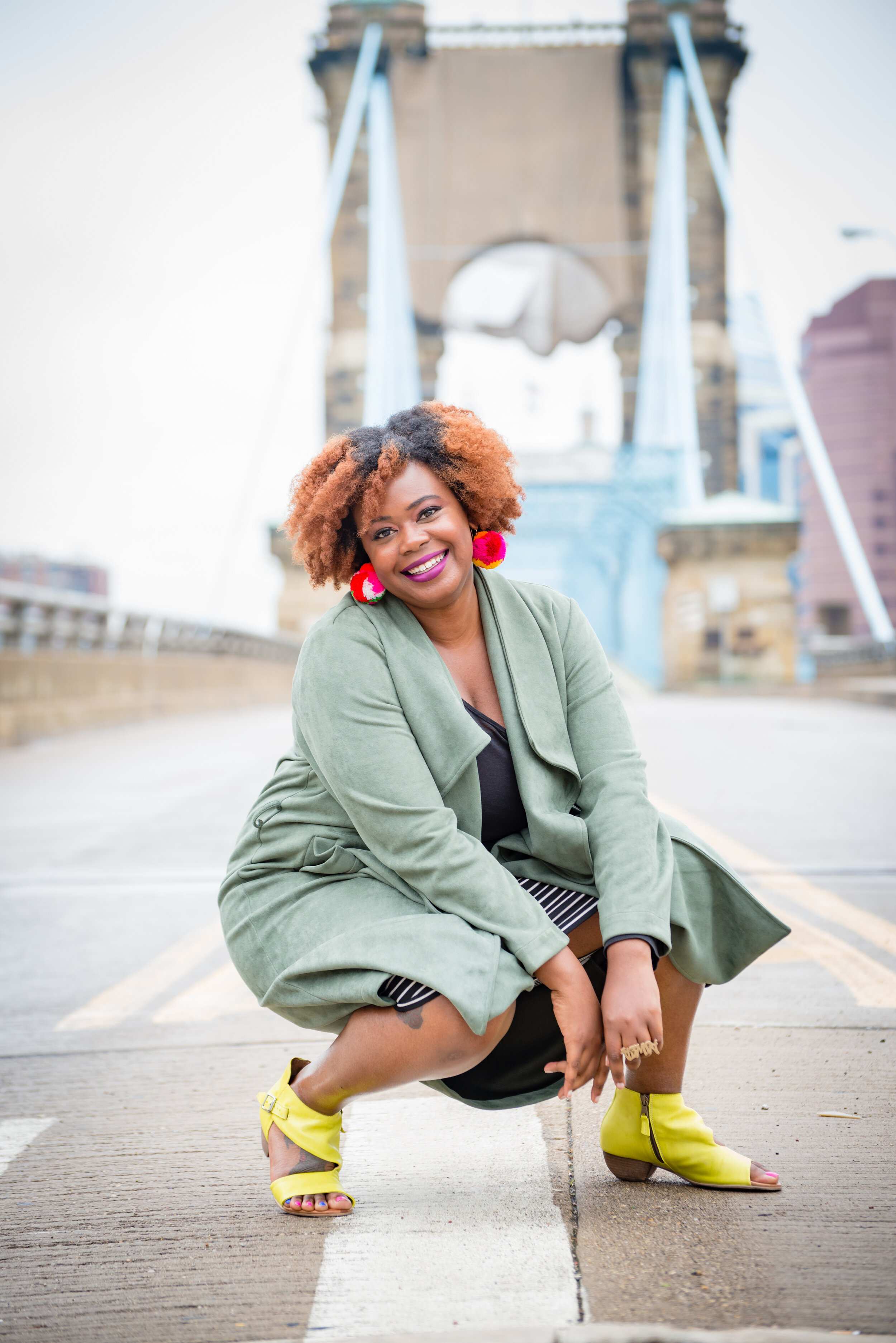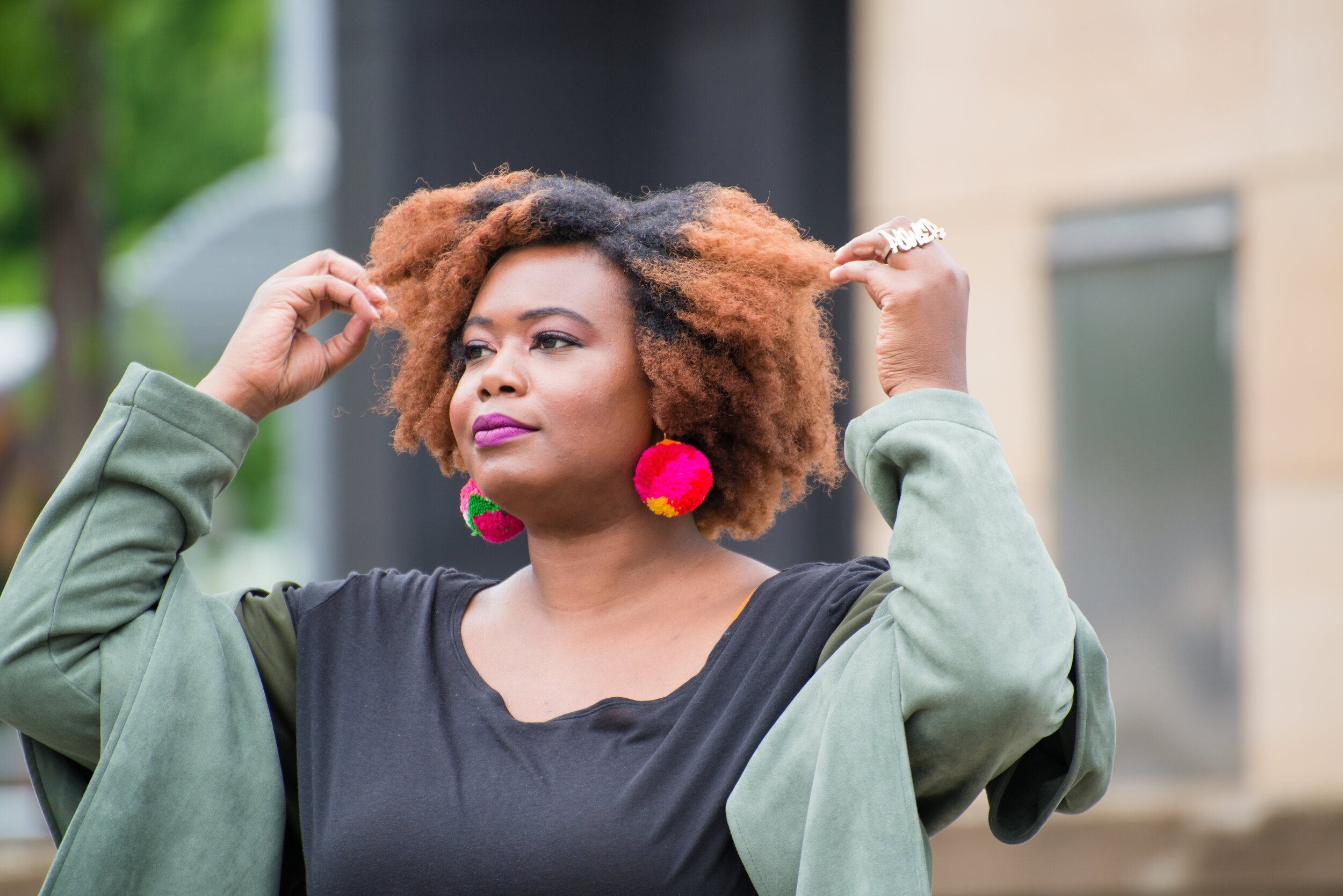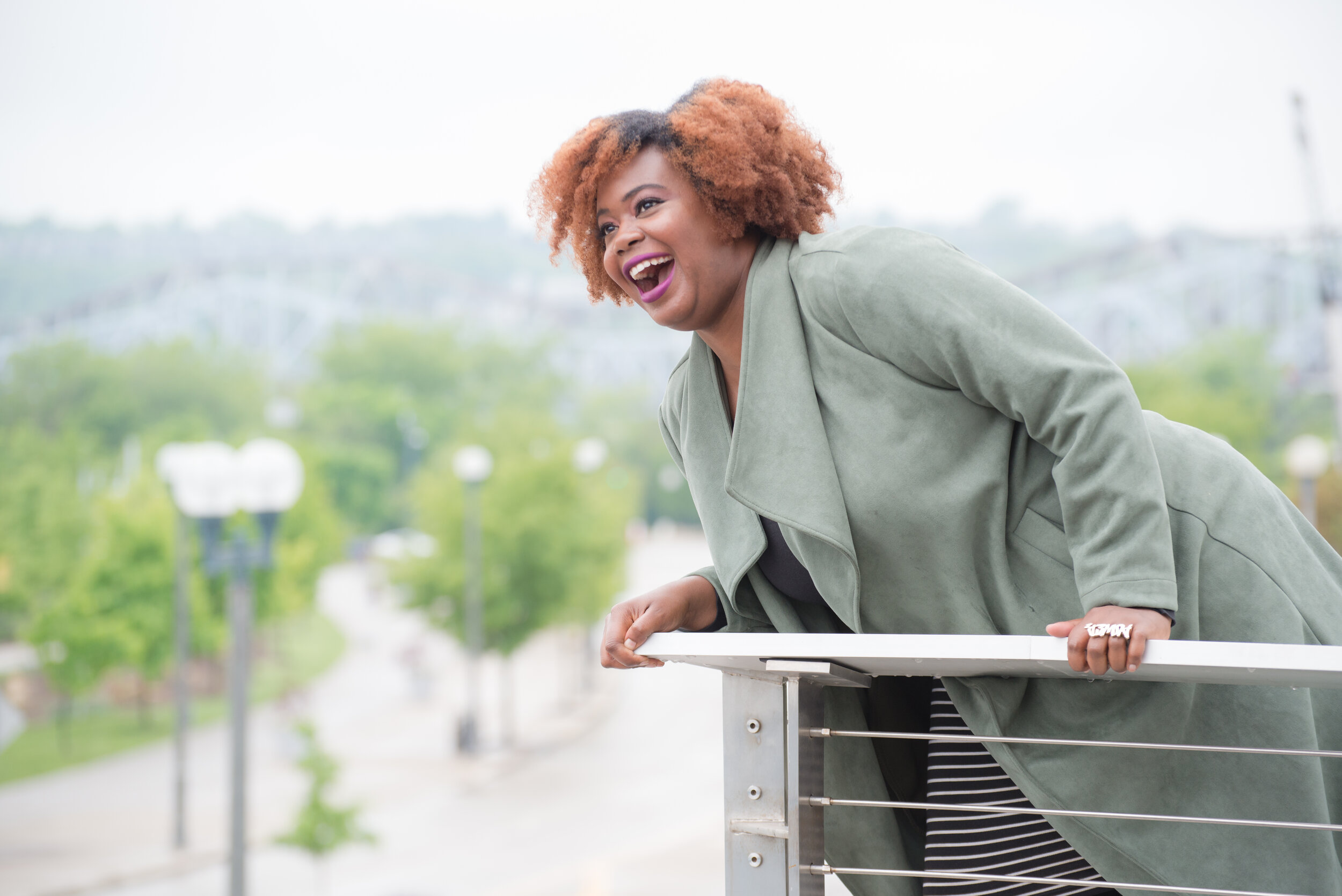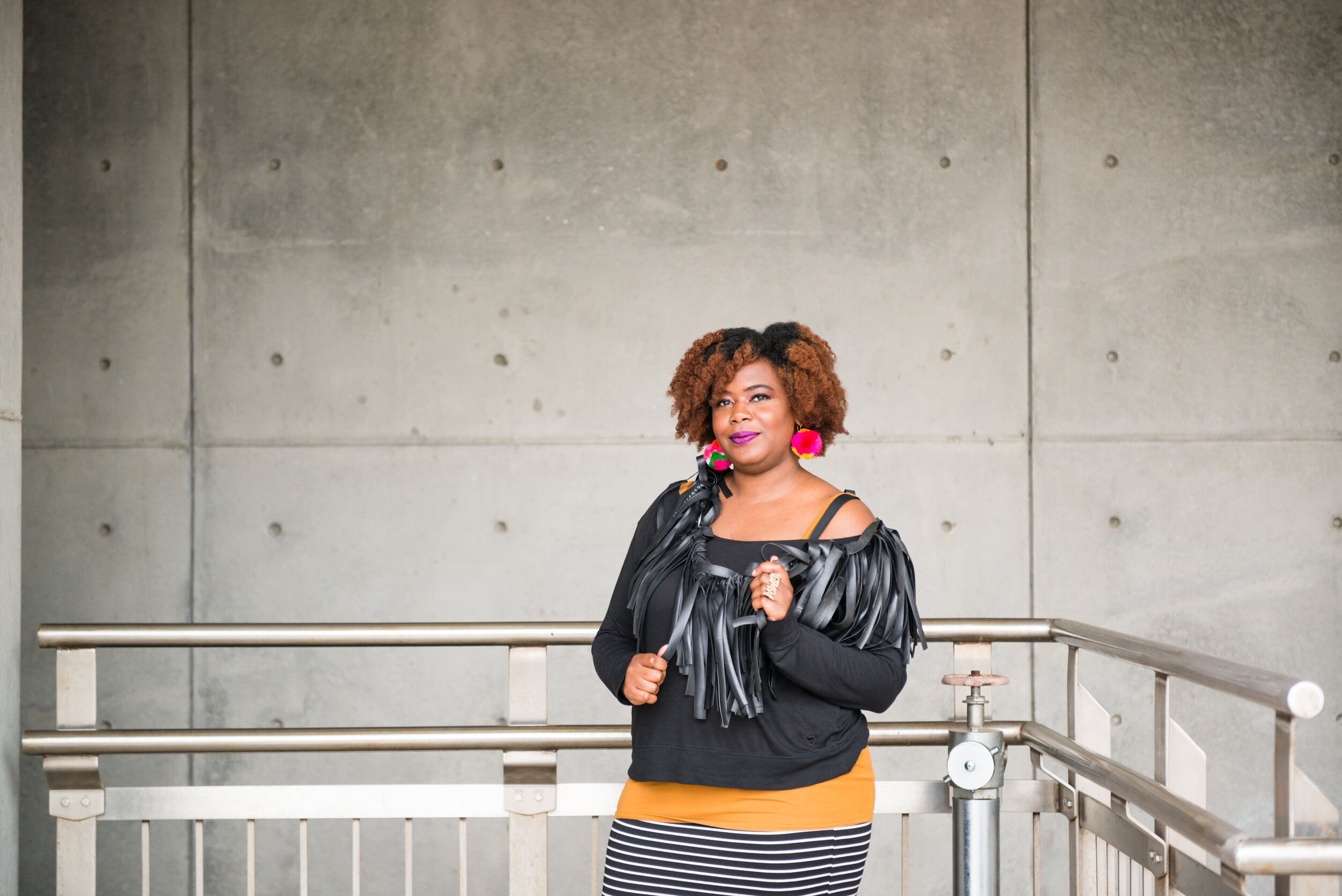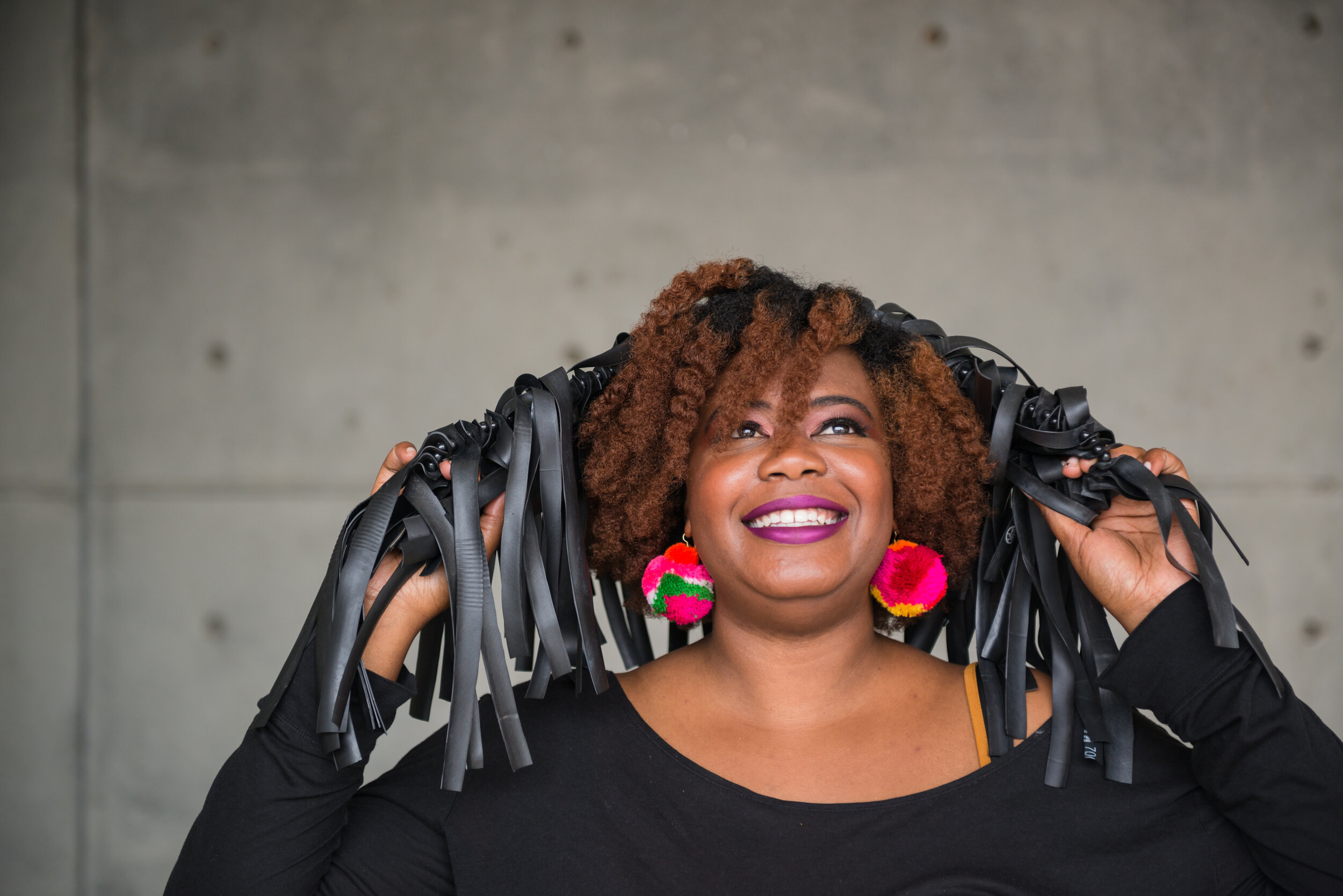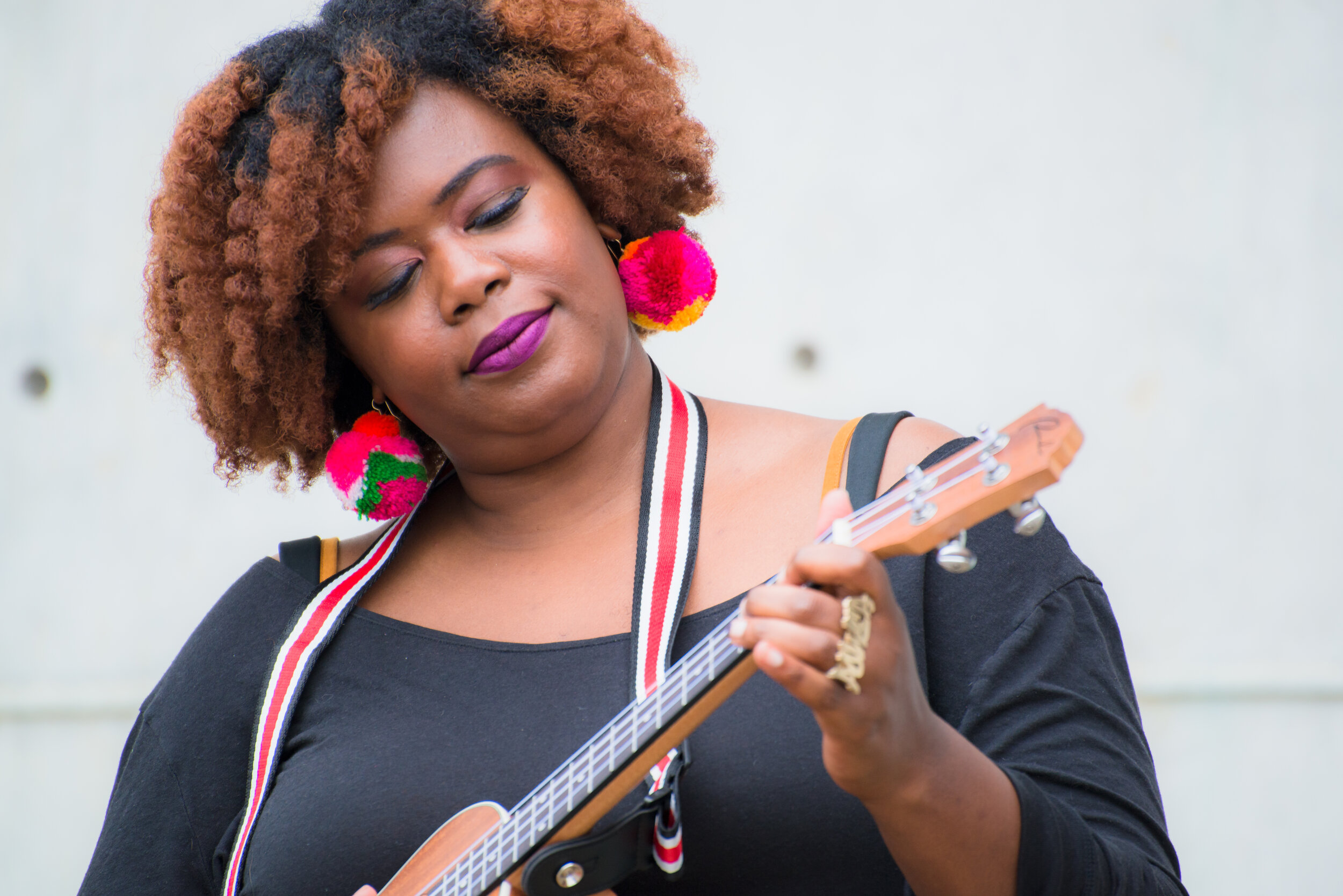Luna Malbroux: At the Intersection of Comedy, Equity, and Inclusion
The first time you meet Luna Malbroux, it becomes clear she’s a natural entertainer. I first encountered Luna when she headlined a Galentine’s Day comedy event at Fibonacci Brewing; she had our Women of Cincy group rolling in laughter. She’s easily the funniest comedian I’ve seen in Cincinnati.
Luna took some time during the COVID-19 stay-at-home order to talk over video with me and photographer Stacy Wegley. What I learned is that Luna knows how to entertain and engage an audience in more ways than just stand-up comedy. She is a modern-day renaissance woman who isn’t letting COVID stop her from learning new skills and making plans for the future.
Interview by Abbey Bruce. Photography by Stacy Wegley.
Women of Cincy currently adheres to social distancing guidelines during all interviews.
Let’s start by giving our readers a glimpse into who Luna is.
Well, aren’t we all still figuring that out? [Chuckles.] I do a lot of things. I am a comedian, a writer, a playwright, and I also write articles. Really, I think my thing is exploring creativity and conversations in as many different genres as possible. By day, I do a lot of cultural humility and equity training with organizations in Cincinnati and across the country. The work all bleeds into itself, whether it's focused through humor or focused through dialogue. I just started picking up playing a few instruments, so that’s going to be in the mix as well.
How did you get into comedy?
I grew up acting in a small town – Opelousas, Louisiana. There was a little theater there. I had a talent for comedic stuff; I like the serious stuff, but I just love the comedy stuff. Yet, it never occured to me to do stand-up comedy. I even lived in New York City and was crashing with comedian Jim Gaffigan, unbeknownst to him. My best friend was his sister-in-law and he had an extra apartment that we were staying in. He had no idea. But I didn’t think about doing stand-up comedy until I moved to San Francisco and stumbled upon an open mic night. I thought, “What a great way to release stress at the end of the day,” and now I’ve been doing it for… 8 years.
Do you find it hard to balance being a feminist, being politically correct, and being in comedy?
That’s an interesting question. I think because of the work I do, specifically around equity and inclusion, I’m in a very tricky place. Comedy is about pushing boundaries or being thoughtful and sensitive to things. Say you push a boundary with an identity that you personally have – you could play around with that a little more. As someone who does work around bias, I know if I were to say [the same thing] at a training, it would have a different impact. I think that it's always a challenge and a barrier for me. Real humor is finding an interesting new angle. And not misogyny or punching down on a woman; it has to be smarter.
Who are your influences? How do you come up with your content?
It’s a mix of real-life experiences, annoyances, and observations. I think a lot of great humor comes from things that get on your nerves, and you’ve just got to vent about it.
There’s so many comedic inspirations. Now is such a great time to be a comedian because there are so many great comedians out there doing brilliant stuff. One of the earliest comedians I loved was Sarah Silverman. That’s who I watched as a kid; I love her work. Maria Bamford is probably my favorite comedian. She’s a “comic’s comic” who explores different topics, like mental health and other things that show her vulnerability. She does it through characters and voices, and there’s a realness to her that I don’t see in a lot of other comedians. Of course, there’s Dave Chapelle, though I wouldn’t necessarily call him an inspiration. “The Chappelle Show” was an inspiration to a lot of comedians in general. His earlier stuff particularly spoke to me. His new stuff... not so much. I’m okay with that being on the record.
Can you tell me about a time when you really felt like you found someone who represented you on T.V.? When you saw yourself in the media?
I feel like I saw my particular brand, and myself in general, represented by “2 Dope Queens.” I don’t know if you’re familiar – it was a podcast with Jessica Williams and Phoebe Robinson and now they have a show on H.B.O. I had never seen that type of playfulness and Blackness represented on screen: two women who owned their Blackness, and at the same time, were outside of what you normally see representing two Black women. It was really cool to listen to their podcast and see them on T.V. [Williams] was the first Black woman to be a correspondent on “The Daily Show.” They both have been inspirational to me. They have been in so many places where , growing up, I never saw Black women. Now I look at all the different things I can do and that I have access to.
What comedians should be we paying attention to right now?
There are so many. I would say Bridget Denman is a rising star. She’s a trans comedian in Cincinnati; she’s only been doing comedy for 2 years, she hosts a couple shows, and she is pretty solid and really reliable. She is good people. Just thinking about representation and how important that is... it’s really hard. There aren’t many trans comedians in Cincinnati and she is having real conversations in a lot of places – just throwing it out there everywhere she goes, being her real self, and she’s funny.
What do you hope folks walk away with after one of your shows? What’s different for them from when they show up to one of your shows to when they leave?
I love that question. I hope they kind of get a chance to think, “I’m not alone in this. Whatever I am is okay. I’m okay.” I think that is why people like comedy in general. Comedians are very self deprecating. You know, when you hear someone else say, “My life is a mess” and they’re able to laugh about it, and you think “My life is a mess, too!” I hope they walk away with that feeling that they aren’t alone and they are okay.
Are you funny all the time?
Absolutely not! Humor is a coping mechanism. I go to humor as my defense mechanism; my safe place. I turn it on and off. It’s great when I’m hanging with friends and we can joke and clown. Most of the time I don’t even tell people [I’m a comedian] unless I’m trying to get people to come to my show.
Real humor is finding an interesting new angle. And not misogyny or punching down on a woman; it has to be smarter.
Most comedians are not funny all the time; they’re actually shy and not the loudest voices in the room. Everyone knows the comedians that cannot shut it off and are always on their own show... People get annoyed by them.
How are you coping with COVID-19?
It’s been really fascinating. I told you I’m getting into music; we have a piano that was gifted to us. Over the past few months, I’ve been trying to learn [how to play]. Ever since COVID-19, there have been days when I literally spend 8 hours playing the piano. It regulates me and helps me calm down. It’s not even like I’m trying to learn a new skill, but I can’t really do anything else right now. My work has slowed down significantly because I had a lot of trainings booked up for March and April and, of course, that’s all out the door. People aren’t into training virtually right now because they’re basically just trying to wrap their minds around survival. It’s just a really interesting time. I get to explore my creativity in a lot of new and weird ways, you know, getting back into music.
Where’s the first place you are going when this is over?
I want to go to the most crowded room. Someone said the other day, “I miss MOTR and their burgers.” I want to go to MOTR on a crowded night, wade through the crowd, and eat in the middle of the damn floor while everyone is around me. I don’t even know when that world will be.
How do your creative pursuits – be it your music, scripted playwriting, or your comedic work – flow into your day-to-day work guiding people on a journey through equity and justice?
What I have learned in my life is that I have to do those creative things. That sounds cheesy. There have been times when I’ve been performing, but because I have other work bringing in [money], I get to be at this place where [performing] isn’t about making it or making money; it’s about creating art and letting it go. In that sense, it’s a gift and makes me feel like a real person. Anyone going in and having conversations around those topics [of equity and justice] has to be a real person. You have to be vulnerable and flawed in front of people. That’s a really important skill when facilitating conversations and connecting with people.
I didn’t realize in all my research that you tackle so many things. In regard to your work with diversity, if you could send a message to readers, what would that be?
Diversity and inclusion is not a substitute for equity and justice. That is the number-one thing people need to know. Secondly, I think we have to change our focus from how we talk about race and racism to how we listen. That’s what a lot of my work is doing: helping people listen to other people and their own experiences. I think too much focus has been on “what I can’t say” or “what I can't do.” We aren’t even at that place – not everyone is on the same page yet. There is still a lot of listening that needs to be done. How do we foster that in our communities?
How did you find yourself working in equity and justice, particularly through dialogue as a primary medium?
I was doing community organizing work back in college, having conversations with communities on healthcare, childcare, and voting rights. I was doing a lot of community engagement. In grad school, I focused on social work and international social welfare. I did a lot of training on the ways identity affects how people show up in society and how they’re treated, understanding privilege and how resources affect people.
Diversity and inclusion is not a substitute for equity and justice.
From there, I was doing a lot of equity work. I started doing consulting and was a facilitator with the Anti-Defamation League in the Bay Area. I started doing things on my own, holding lots of different conversations in different ways. I did a creative project called “Mapping Privilege,” where I would travel around the country and talk to people about identity. I was able to bring more humor and play into that work and that led to more independent work and paving my own way.
Can you tell us more about “Mapping Privilege”?
In 2016, which was a crazy year, I was writing; it was freelance work for Gawker. I traveled to Baton Rouge, where I used to live, in the wake of Alton Sterling being murdered. I talked to people and realized that the conversations I was having around the shooting of an unarmed black man sounded different than the conversations I was having in the Bay Area. That got me really curious about how we aren’t using the same language or looking through the same lens. It was really fascinating and vulnerable to talk to people. I wish there was more rhyme or reason or strategy in how I did it. I just drove across the country and wrote articles about it.
Did you find that people were open to having those conversations with you?
I think people were really open – especially because I wouldn’t ask them directly, “What do you think about privilege?” I wouldn’t use jargon. I would say, “Tell me how you see yourself. How do you think you are seen? How do you think others see you? How does all of that match up? How do you move through the world?” I think that's a question a lot of people don’t get asked.
If you were to answer those same questions, how do you think you are seen? How do you see yourself?
Nobody has ever asked me that before! Oh man, I spend a lot of time analyzing how people see me, just from being someone who gets up in front of the room. I think people project things they’ve already seen onto me; I play around with that in my comedy. I play around with assumptions as soon as I step up to the mic. Like, “Oh, here comes this Black woman who’s going to be raw and funny.” I play around with those things.
I’m seen a lot of different ways depending on who’s looking and through what lens. I think, overall, I’m seen as someone who is a dominant personality. I think I am actually a lot more reserved than I come off. Even in stand-up, I talk about sex and other things and people think I’m an open book. That is, the back end of the book. You are getting the jacket cover, not chapter twelve.
Tell us about an inspirational woman in your life.
There are so many. There’s a quote from Michelle Obama: “We should always have three friends in our lives: one who walks ahead, who we look up to and follow; one who walks beside us, who is with us every step of our journey; and then, one who we reach back for and bring along after we've cleared the way.”
I think I’d say one of my closest friends, Tulica Singh – who is a director, writer, and editor – has made some really creative movies. Tulica is someone who really inspires me because we have been on a similar journey – a similar path – over the past few years as we discover our craft. She really inspires me to keep on exploring my voice and my craft.
Do you know an awesome woman of Cincy? Nominate her here! New features launch on Mondays.


